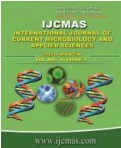


 National Academy of Agricultural Sciences (NAAS)
National Academy of Agricultural Sciences (NAAS)

|
PRINT ISSN : 2319-7692
Online ISSN : 2319-7706 Issues : 12 per year Publisher : Excellent Publishers Email : editorijcmas@gmail.com / submit@ijcmas.com Editor-in-chief: Dr.M.Prakash Index Copernicus ICV 2018: 95.39 NAAS RATING 2020: 5.38 |
A field study was conducted during the Kharif season of 2017-18 at Department of Vegetable Science, Kalyanpur, Chandra Shekhar Azad University of Agriculture and Technology, Kanpur to study about the effect of bio-fertilizers on growth, yield and yield attributing characters of Brinjal (Solanum melongena L.) cv. Azad B-3. The experiment was laid out in a randomized block design with 10 treatments replicated thrice. Four different bio-fertilizers viz., Azospirillum, Azotobacter, PSB (Phosphorous solubilizing bacteria) and VAM (Vesicular Arbuscular Mycorrhiza) were used alone and in different combinations with chemical fertilizers. All the bio-fertilizers are applied as seedling root dip method in which 200g of each bio-fertilizers are dissolved in 3 liters of water in different containers. The roots of brinjal seedlings are dipped in it for 10 minutes immediately after transplanting and then transplanted into main field after keeping in shade for 5-10 minutes. Among all the treatments, it is noticed that the growth, yield and yield attributing parameters like plant height, number of primary branches, number of secondary branches, fruit length, fruit width, total number of fruits/ plot and fruit yield were found maximum with the application of Azospirillum + PSB + 75% N + Full P & K and the minimum being recorded in control T1 in which no bio-fertilizers and chemical fertilizers were used. So based on the results it could be concluded that the application of Azospirillum and PSB in combination with 75% N and full N & K favourably influenced the growth, yield and yield attributing characters in brinjal cv. Azad B-3
 |
 |
 |
 |
 |